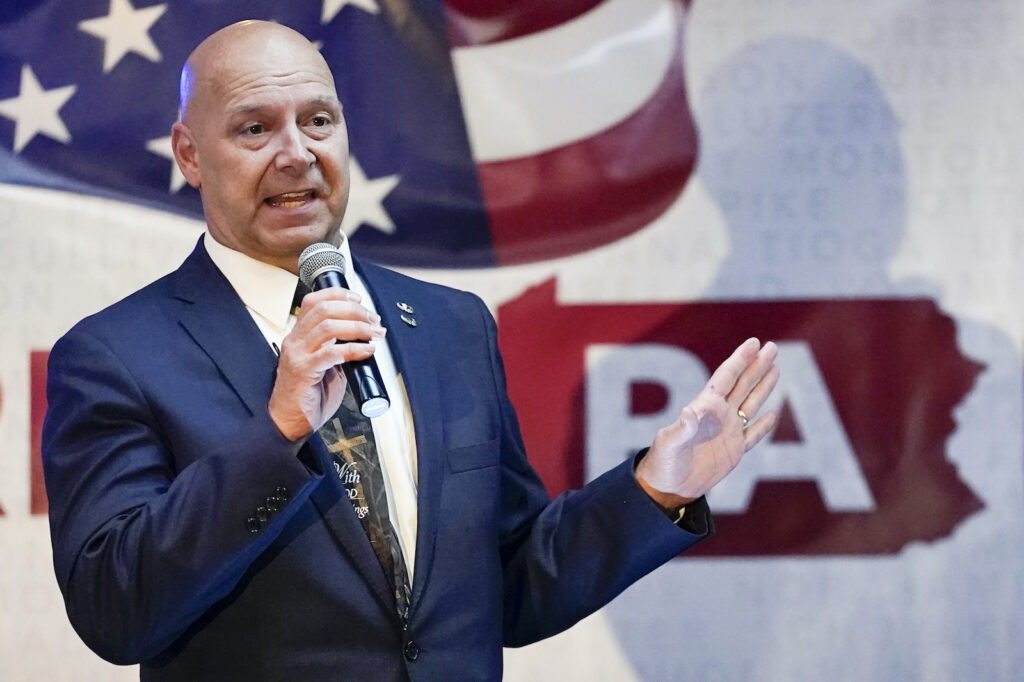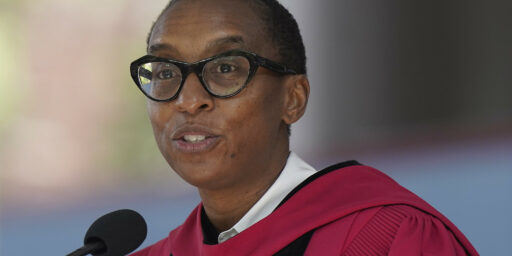Mastriano Under Fire From Colleagues and Mentors
A former dissertation advisor and two Army War College professors are speaking out against the gubernatorial candidate.

I’m not sure what to make of the NYT report “Mastriano’s War College Stint, Once a Selling Point, Comes Under Fire.”
The crowning chapter of Doug Mastriano’s military career — a stint on the faculty of the U.S. Army War College — has flared up in his campaign for Pennsylvania governor.
Two former professors at the War College in Carlisle, Pa., publicly declared Mr. Mastriano unfit for public office. A photograph surfaced of Mr. Mastriano posing in a Confederate uniform with other faculty. And Mr. Mastriano’s Ph.D. dissertation has been criticized as deeply flawed, with a former academic adviser saying his doctorate rests “on very shaky grounds.”
Mr. Mastriano — the Republican nominee for governor in a crucial battleground state — received his Ph.D. in history from the University of New Brunswick in Canada in 2013, the year after he joined the faculty of the War College. His research focused on a World War I hero, Sgt. Alvin York, who credited his exploits killing and capturing German soldiers to divine intervention and who inspired the 1941 Gary Cooper movie “Sergeant York.”
“I think Mastriano really likes that story because York became the kind of spiritual warrior that Mastriano sees himself as being,” said Jeffrey Scott Brown, a history professor at the University of New Brunswick who advised Mr. Mastriano but objected to his academic techniques. Dr. Brown’s criticisms included Mr. Mastriano’s amateur archaeological sleuthing on a French battlefield and his credulity in accepting divine intervention to explain Sergeant York’s heroics.
“I’ve been concerned about this for a decade,” Dr. Brown said in an interview.
[…]
Two former faculty colleagues said his role as a candidate and state senator in two areas — spreading lies about the results of the 2020 election, and marching on the Capitol on Jan. 6, 2021 — violated his military oath.
“The officer corps is sworn to defend the Constitution rather than any one person or president,” Tami Davis Biddle, who was chair of the War College’s faculty council, wrote in an opinion article for a Harrisburg newspaper. “None of its members is entitled to toy with insurrection, treat Jan. 6 as legitimate protest, or follow election deniers who would undercut our most important political institutions.”
In an interview, Dr. Biddle, who retired last year, said: “If you’re going to say the 2020 election was won by Trump, that was simply not true. To lobby for keeping Trump in office when he had lost an election was outrageous.”
[…]
Another former War College faculty member, Rick Coplen, a West Point graduate and a combat veteran, said Mr. Mastriano had tried to “undermine our democracy.”
Mr. Coplen was a professor of economic development at the War College for a decade. He accused Mr. Mastriano of “helping former President Trump in trying to overthrow the legitimate, clearly understood and agreed-upon electoral results.” His concerns were reported earlier by The Philadelphia Inquirer.
Mr. Coplen ran unsuccessfully this year in the Democratic primary for a congressional seat in South Central Pennsylvania. He said his criticism of Mr. Mastriano was not motivated by partisanship.
“This is about the fundamental stuff of American democracy,” he said in an interview. “When I was 18 years old, like my fellow West Point cadets, I raised my right hand and pledged the same oath to the U.S. Constitution. That’s most important, regardless of party.”
Dr. Brown, at the University of New Brunswick, was a member of the examining board for Mr. Mastriano’s dissertation.
He objected to Mr. Mastriano’s field research in France that claimed to precisely identify the location of Sergeant York’s heroics, which Dr. Brown said was conducted amateurishly with members of Mr. Mastriano’s son’s Boy Scout troop. He also objected to assertions in the dissertation that Sergeant York was protected by the hand of God. On Page 223 of his dissertation, Mr. Mastriano writes, “The idea that York survived the carnage because of Divine Intervention also speaks of a miracle.”
Dr. Brown said such a statement was unscholarly. “You’re allowed to discuss someone’s belief — that York believed there was literal divine intervention,” Dr. Brown said. “But to present it as settled historical fact is not acceptable for professional historians.”
Another scholar, James Gregory, a history graduate student at the University of Oklahoma, has identified what he says are multiple errors in Mr. Mastriano’s treatise. After he reported 35 problematic passages to the University of New Brunswick, Mr. Mastriano added 21 corrections in 2021. But Mr. Gregory insisted there were many more issues that, in his view, added up to academic dishonesty.
Dr. Brown shared documents he wrote in 2013 spelling out his own objections, including an email he said was sent to Mr. Mastriano’s dissertation supervisor raising “serious misgivings.” Nonetheless, the Ph.D. was granted. Dr. Brown’s name appears on the dissertation, which, he said, surprised him because he had been told he was no longer needed on the evaluation committee.
The University of New Brunswick, which released the dissertation last month under pressure, said in a statement it could not discuss Mr. Mastriano’s degree without his consent. It added that two independent academics would review the university’s procedures to ensure that its granting of doctorates meets “the highest standard.”
Mastriano is a right-wing kook who’s unfit to be governor of Pennsylvania. Given that he’s been trailing his Democratic opponent by double digits in the polls for months, it seems the people of Pennsylvania agree. We’ll know for sure in a couple of weeks.
That said, I’m deeply uncomfortable with all of this as an academic.
I applaud James Gregory, a scholar with no connection to Mastriano, unearthing problems with his dissertation and reporting them to the degree-granting institution. Especially since the dissertation has since been turned into a book at the University Press of Kentucky and is likely to be cited by future scholars.
It is simply unprofessional in the highest order, though, for a member of his committee to go to the press and argue that the credential shouldn’t have been earned. That he considers the fieldwork amateurish and is aghast that Mastriano attributed York’s actions to divine intervention is interesting; indeed, I agree with him on the latter (I don’t have enough information to judge the former). But going public this way—in the context of a political campaign almost a decade later—brings every degree awarded by his department into question. It’s frankly bizarre behavior.
I’m also somewhat uncomfortable with Biddle and Coplen coming out as they have against a former colleague. It would be one thing if they had some new insight to share based on Mastriano’s conduct at the War College. But they are simply leveraging the fact that they overlapped on the faculty to gain traction to give their opinion on his recent actions in support of the Big Lie. They have no more expertise to comment on that than any other citizen.
Again, Mastriano seems like a nut to me. It continues to shock me that people like this can rise to colonel (or three-star general, in the case of Michael Flynn) in our Army. And it saddens me that these traits are now enhancing, if not required, to gain the Republican Party nomination for major office.





This brings to mind the post a couple weeks ago about the organic chemistry professor. How much can we trust modern academic credentialing?
Mastriano is a perfect illustration for one of my hobby horses: When I said as far back as the 2016 primary that Trump IS he Republican Party, I meant that Trump is not an aberration but is actual just the rawest form of what the Republican Party has become since embracing the Southern Strategy. The Republican base (i.e. the ones who actually participate and therefore the actual base) pick these candidates as best representing them. These candidates are not imposed on the base.
Heck, even in the neighboring state of Maryland, a place where a sane Republican had a very real chance of succeeding the current popular GOP office holder, it was impossible for a sane gubernatorial candidate to win in the Republican Primary.
@MarkedMan: While Dr. Taylor patiently explains to us that “Republicans gonna Republican” and “Democrats gonna Democrat,” the party bases are repeatedly given multiple choices in their primaries and the Republican base repeatedly chooses candidates like Mastriano. At some point, it ceases to become an expression of limited partisan choices and becomes a definitive statement of who the party base is.
Do you think that war college professors should speak out on a threat to democracy?
That’s where we are now. It’s not the usual academic backbiting.
That he’s 300 pounds of shite stuffed into the skin of a 200 pound man?
@Joe: As far as I can tell, Steven accepts that the most active participants in a party are the ones that will end up choosing the candidates, but he feels that if there are more parties then people who are less active (i.e 70% of the voters) and only start paying attention in the general would be more likely to switch parties and vote for less extreme candidates.
Steven, if I have that wrong, please jump in.
I’d have to agree that this is an odd moment for Dr. Brown to object to methods and assertions in Mastriano’s thesis. I mean, he could have refused to sign off on it until they are remedied.
At the risk of being kind of an “academic inside baseball” I can think of two explanations: The first is that the things Brown is objecting do not represent a major portion of the thesis, and Brown decided to ignore them at the time rather than have a direct confrontation, which might get very messy – freedom of religion and all that.
The second is that Mastriano made very late changes to his manuscript, such as inserting a sentence about a “miracle”, which simply didn’t get noticed by Brown.
@gVOR08: I don’t know much about the university in question but it appears to be quite reputable. That said, I tend to be highly suspicious when folks with full-time jobs manage to get PhDs from foreign universities, especially ones that aren’t big brands. I mean, it’s not like there aren’t PhD-granting universities within driving distance of the Army War College.
@Cheryl Rofer: My problem is that they have no special insights to offer here. They’re simply levering the fact that they happened to be on the faculty at the same time to garner attention to themselves. They’re rendering non-scholarly judgments as citizens and wrapping themselves in War College colors to do it.
@gVOR08: I wasn’t particularly confused about the NYT article; it’s just another variation of a lying politician (this time a Republican, but maybe other times not) taking another chance to burnish his reputation. Riffing off gVOR08’s thoughts,
I would note that the fact that a candidate completes a dissertation does not obligate the institution to accept it. On the other hand, considering that Dr. Brown was relieved of his duties on the committee but nonetheless is included, an argument could be made that in this particular situation completion did constitute an obligation to approveso gVOR08 seems to have a point about the state of academic credentializing.
The department whose degrees are brought into question is the History Department at the University of New Brunswick if it thought “Sgt. York: A Wizard Did It” was serious research worthy of a doctorate.
@Joe: “At some point, it ceases to become an expression of limited partisan choices and becomes a definitive statement of who the party base is.”
I suspect that Dr. Taylor would not disagree with you on that, but I also note that the same conditions apply in “who the base is” as apply in the situation where in a side conversation with my economics professor, I noted that “all things are never equal” and he replied that while that is true, the fiction that they are allows discussion of topics that would otherwise be closed.
For me, I’m okay with “our system is broken and will not become functional until we evolve (HA!!! says my inner creationist) better people.” But that position may well render all of Dr. Taylor’s posts on this topic moot,
@Jay L Gischer:
Are doctorate committees required to be unanimous? It’s possible he did object at the time and was outvoted.
@Jay L Gischer: “I’d have to agree that this is an odd moment for Dr. Brown to object to methods and assertions in Mastriano’s thesis. I mean, he could have refused to sign off on it until they are remedied.”
I may be reading into the text, but it appears to me that Dr. Brown was removed from the committee and then someone signed off on his behalf.
I can only imagine that this actually bolsters Mastriano’s support, as he pulled a fast one on the over-educated twits in their ivory towers.
Aside: The American Experiment was poorly formed, lacking a control group. Unless the control group was Canada.
@Just nutha ignint cracker: Uh, I didn’t get that. There is ambiguity here.
Well, let’s be super academic and look at the text:
and
I don’t think there’s any other text that’s relevant?
The first quote describes Brown as a “former” advisor. I read that as simply stating he’s not the present adviser, but that state can happen quite naturally with one’s graduation. I note that nobody in academia would write things this way, but that holds I think, for both the case of “he was his adviser through graduation” and “he was adviser for a while, but did not sign off on the thesis for some reason”. I mean, there’s a more innocuous explanation than “he was fired”. He might have said, “I can’t sign off on this” and withdrew, and Mastriano went shopping for someone who could. But that would be really, really weird. I’ve never heard of that happening. So that’s my read of the first quote. The granting of a thesis was in the past, and hence Brown’s status as adviser is also a thing of the past, to the writer of this piece.
The second quote also uses past tense – “advised” – and again I would have read that in the simple way – the thesis was a thing in the past, not the present.
Now, if Brown had refused to sign off or withdrew himself before things got there, I would have expected that to have been mentioned specifically.
All that said, I agree there’s ambiguity here. One thing to re-emphasize, though. Advisers do not get “fired”, and for another professor, in the same department, to take up the role after someone has withdrawn, is very unusual.
Another possibility is that “adviser” is being used by the writer as a standin for “on his thesis committee”. I would not use “advisor” that way, but someone who doesn’t know better might. It is perhaps more common for a non-primary committee member to withdraw, and then they would go look for another.
@Jay L Gischer: I thought I covered my opinion/speculation fairly distinctly in my statement
With that disclaimer in place (again) I was simply speculating and have no dog whatsoever in this fight and will not be leasing one from Michael Vick to join it.
Beyond that, I’m not sure that “the truth” [TM] matters. UNB can operate under whatever rules its accreditation board permits.
@Just nutha ignint cracker: Oh, I meant nothing as regards you or your opinion.
It was just an excuse to do a deep dive on textual analysis. Which I kinda love to do, which is a bit odd in a STEM guy, I admit.
@Jay L Gischer: Taking the article holistically, it appears that Dr. Brown was just one member on the dissertation committee and never the actual academic advisor. I think we can file this one under the same idea as “journalists who don’t understand science writing about science.”
@Jay L Gischer: Cool! “What did I say viz a viz what did you hear” was always the most fun part of teaching writing (and probably the most instructive, too).
@Gromitt Gunn: Another great distinction! And another good observation. Big distinction between being AN advisor and being THE advisor. Dr. Brown’s identity/role really really isn’t clear.
@Jay L Gischer:
That is all well and good, but you mostly ignored the part of the text cited by @Just nutha ignint cracker. Reproduced for your ease:
Yes, he was identified as a former adviser. But that wasn’t the only intentification. From OP:
To me, that makes the passage quoted by @ignint cracker far more relevant than the two portions quoted in your response.